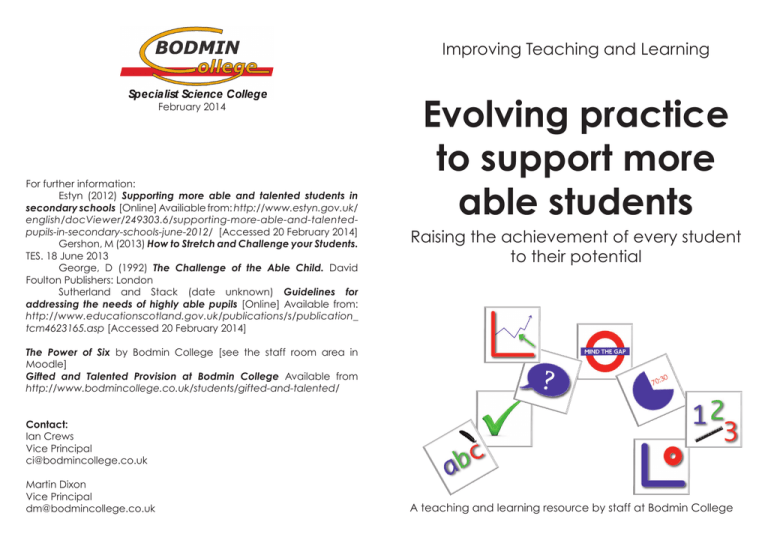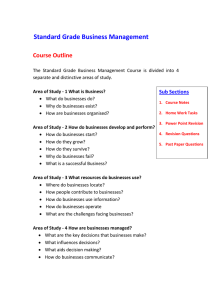Evolving practice to support more able students
advertisement

Improving Teaching and Learning February 2014 For further information: Estyn (2012) Supporting more able and talented students in secondary schools [Online] Availiable from: http://www.estyn.gov.uk/ english/docViewer/249303.6/supporting-more-able-and-talentedpupils-in-secondary-schools-june-2012/ [Accessed 20 February 2014] Gershon, M (2013) How to Stretch and Challenge your Students. TES. 18 June 2013 George, D (1992) The Challenge of the Able Child. David Foulton Publishers: London Sutherland and Stack (date unknown) Guidelines for addressing the needs of highly able pupils [Online] Available from: http://www.educationscotland.gov.uk/publications/s/publication_ tcm4623165.asp [Accessed 20 February 2014] Evolving practice to support more able students Raising the achievement of every student to their potential The Power of Six by Bodmin College [see the staff room area in Moodle] Gifted and Talented Provision at Bodmin College Available from http://www.bodmincollege.co.uk/students/gifted-and-talented/ Contact: Ian Crews Vice Principal ci@bodmincollege.co.uk Martin Dixon Vice Principal dm@bodmincollege.co.uk A teaching and learning resource by staff at Bodmin College What is a ‘more able’ student? How many we have got? What do we do to plan for more able students? How can we evolve our current practice for the more able students in our teaching groups? This booklet summarises high quality practice and new ideas for supporting more able students across Bodmin College. It is designed as a resource to support staff in their planning and delivery of inclass teaching and learning. Stretching and Challenging Reasoning: When pupils share their opinion with you, or with a partner during discussion, push them to explain what underpins that opinion. Do not let unsupported assertions escape without asking “Why?”, “What reasons do you have for thinking that?”. You can even train your pupils to start asking these questions of each other. Products: Plan your lessons so that pupils are building up to creating some kind of product – an essay, perhaps, or an extended piece of drama or a presentation. This will imbue your lessons with purpose and show them that you believe they can create significant pieces of work. Success criteria: Make sure that every pupil knows what the success criteria are for each major piece of work you ask them to do, and that it is possible for everybody to attain them. In a positive classroom, pupils will be more likely to push themselves to excel. Gershon (2013) More able students are identified on the SIMS database through the Raise Attainment Band KS2 Import column. Approximately 30% of our students are of high ability and although this varies between years groups, their progress and attainment can become affected by teachers who plan to teach ‘to the middle’. By doing this, more able students lack the stretch and challenge required to help them achieve; instead some of these students can be tempted to coast through their education. Although Ofsted state that, ‘It is unrealistic...for inspectors to necessarily expect that all work in all lessons is always matched to the specific needs of each individual’ we recognise that we need to provide challenges for more able students so that they can learn at the same rate as our middle and lower ability students. By teaching to the top and supporting to the bottom we can ensure that all students in a class can make good progress, whether mixed ability or organised by setting. “ “ 1 What does the school need to do to improve further? Improve the progress of more-able students Bodmin College Ofsted Inspection, 2014 6 New Strategies: What we could do? Strategies suggested by staff include: • Teach to the top and support through middle and lower abilities. • Give extension tasks to more able students that specifically target analytical skills. • Use more focused DIRT to enhance the rates of progress. • Further develop the use of literacy to enhance reading for understanding, speaking and listening and writing in a more analytical way. • Ensure that learning objectives are tiered through Bloom’s and that they achieve levels for more able students. • Use differing structures in the classroom to encourage talk between different groups of students. This will encourage more able students to think more about their audience for the points they wish to make. • Use more debating and discussion with the more able groups in a class. • Set more challenging work to challenge more able students, even if the work is not directly linked to the course criteria. g • Begin with ‘some’ when all/ ed seatin ll e v le p rDevelo most/some strategies are used. age inte r u o c n e plans, to versation. This • Audit more able provision on lity ability c within each key stage, unit of gher abi i h n a e may m gether work and individual lessons. ouped to r g g n i e b ability • Place more able students iffering d h t i w or . on departmental agenda at students regular intervals. • Build higher order thinking skills into every lesson. • Give cognisance to metacognition and metalearning promotion through KS3 and KS4. • Provide additional departmental training in areas that more able students will need to access. 5 Some current practice at Bodmin College that works well • Higher order questioning is directed at more able students. • There is a raised expectation of outcomes. • More able students are encouraged to assist TAs as subject matter experts. • Subject specialists (more able students) lead on certain topics with other students. • Regular conversations are held with more able students at an aspirational level. • Levelled feedback using level descriptors is provided for all abilities. • The level of language engagement is targeted to more able students using differentiated verb and sentence structure. • Extension sheets and tasks are given to more able students. • Critical thinking skills are explicitly taught. • The department works on the assumption that more able students will continue to A level, from Year Seven. • From Year Seven, the department focuses on all students making four and five levels of progress. • GCSE themes are embedded early in KS3. • Explicit teaching is given about the success criteria for the highest grades and is linked to specific activities. Exemplar work from students and staff is shared with higher ability students. This sets high expectations and aspirations. 2 ort for p e R l o Scho ahl Roald D aged 16 y is ‘The bo lent an indo terate and illi r of the membe ’ class. School Report for David B ellamy ‘Bellam y good fe is a llo is matu w, ring well bu t academ is icall useless y ’ ‘[Higher ability students] are those who are functioning at the upper end of that particular key stage or one key stage ahead and whose abilities are so well developed of their peer group that a school has to provide additional learning experiences which develop, enhance and extend their abilities. David George (1992) ty in such dispari Why is there igious st the most pre of admissions to u small n mber a n ee w et b hools and universities d selective sc n a t en d en tained indep f state-main o ty ri jo a m the great cademies? schools and a e v ti ec el -s n o n Ofsted 2013 ‘Gifted and talented children have special needs and special problems, though not all. They also have special, sometimes immense, talent to give to society. We owe it to them to help cultivate their abilities and society to help prepare tomorrow’s leaders and talent. More able children are the most precious natural resource in the world and one cannot be allowed to be squandered. Survival and achievements of the human species owe much to one characteristic - a capacity for creative problem solving. This ability to find answers to problems remains a vital one. A major objective of more able education is to recognise and foster this ability. Unfortunately, the pursuit of this, and related objectives, is often plagued with confusion, misconception, doubtful assumptions, exaggerated claims and a lack of communication.’ David George (1992) How to provide challenge 1. Identifying the student’s next steps and creating cognitive dissonance. 2. Injecting elements of novelty and variety into the learning experience. 3. Encouraging metacognition. 4. Offering opportunities for independence and self direction. 5. Encouraging risk taking, 6. Providing opportunities to work with like-minded peers. Sutherland and Stack (Accessed 2014) 3 School Rep ort for Ludwig va n Beethove n ‘As a com poser, he is hopeless’ Schools should: • Provide enriched opportunities and appropriately challenging provision across the curriculum for more able and talented pupils to achieve the highest standards. • Ensure that more able and talented pupils from disadvantaged backgrounds receive specific support to overcome barriers to their learning. Estyn (2012) 4




